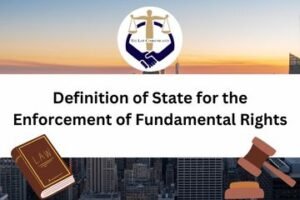Q. What is Judicial Presumption? Explain giving special effects to the law relating to the abatement of suicide by a married woman.
A presumption is an acceptance of a fact as true or existent based upon its strong probability evident from the circumstances. For example, if a man has not been heard from for 7 years by his closest relatives, the court may believe in that the man is dead. This is a presumption. Thus, when the court presumes the existence of a fact because of its strong probability but without direct or conclusive proof, it is called a presumption. When a court presumes a fact, the party in whose favor the fact is is relieved of the initial burden of proof.
For example, as per the Negotiable Instruments Acts, every holder of an instrument is presumed to be a holder for consideration. So if person A holds a cheque signed by another person B, it is presumed that A has given consideration for the cheque and so A does not have to provide any proof of that consideration. Of course, this presumption only applies at the beginning. The other party is free to provide proof that disproves the presumption. For example, the opposite party can show letters from the person or a recent photograph of the person showing that he is still alive.
According to English Law, a presumption can be of two kinds – presumption of fact and presumption of law.
Presumption of Fact
Presumption of fact is that presumption about things or events that happen in day-to-day life, which we accept as true due to inference is drawn logically and naturally by our mind. Such as the presumption that a man with blood-stained clothes and a knife in his hands is the murderer. Such presumptions are rebuttable from further evidence.
Presumption of Law
Presumption of law is arbitrary consequences that are annexed by law to particular facts. They are a legal fiction. They may not be the same as the inferences that we may ordinarily draw but the law prescribes that such inference may be drawn. For example, it is a presumption of law that a child below seven years of age is not capable of committing a crime. Or that a person who has not been heard from for seven years is dead. Such presumptions may or may not be rebuttable depending on the law. For example, the presumption that a child below seven years of age is not capable of committing a crime cannot be rebutted. Law presumes the age of the child as conclusive proof of his innocence. But the presumption that a person is dead when he is not heard from for 7 years is rebuttable by showing evidence.
May Presume and Shall Presume
Provisions of Section 4, in a general sense, correspond to the above classification. The first part of this section defines “May Presume” as follows –
“May presume” – Whenever it is provided by this Act that the Court may presume a fact, it may either regard such fact as proved, unless and until it is disproved or may call for proof of it. It gives the court discretionary power to presume the existence of a fact. This means that the court may regard the fact as proved unless and until it is disproved. For example, in the case of Dr. T T Thomas vs Elisa AIR 1987, where a doctor failed to perform an emergency operation due to lack of consent, the court presumed that the consent was there since the patient was brought to the hospital. It was up to the doctor to prove that the consent was not there. The court may also ask for further proof before making the presumption.
All the presumptions given in Section 114 are of this kind, which says that the court may presume the existence of any fact which it thinks likely to have happened regard being had to the common course of natural events, human conduct, and public and private business, in their relation to the facts of the particular case. For example, the court may presume that a man who is in possession of stolen goods soon after the theft, is either the thief or has received the goods knowing them to be stolen unless he can account for his possession.
The second part of the section defines “Shall Presume” as follows –
“Shall presume” – Whenever it is directed by this Act that the Court shall presume a fact, it shall regard such fact as proved, unless and until it is disproved. It basically forces the court to presume a fact that is specified by the law unless and until it is disproved. The court cannot ask for any evidence to prove the existence of that fact but it may allow evidence to disprove it. For example, Section 90 provides that where any document, purporting or proved to be thirty years old, is produced
from any custody which the Court in the particular case considers proper, the Court may presume that the signature and every other part of such document, which purports to be in the handwriting of any particular person, is in that person’s handwriting, and, in the case of a document executed or attested, that it was duly executed and attested by the persons by whom it purports to be executed and attested. Presumption about abetment of suicide of a married woman (S. 113A) and Presumption about dowry death of a woman (S. 113B) are of this kind.
Third part of the section defines “Conclusive Proof” as follows –
“Conclusive proof” – When one fact is declared by this Act to be conclusive proof of another, the Court shall, on proof of the one fact, regard the other as proved, and shall not allow evidence to be given for the purpose of disproving it. For example, birth during the marriage (S. 112) is conclusive proof of legitimacy.
Presumption and Burden of Proof
Justice Venkataramiah, of SC, observed the following, in the case of Sodhi Transport vs State of UP, 1986 – A presumption is not evidence in itself but only makes a prima facie case for the party in whose favor it exists. It indicates the person on whom the burden of proof lies. When the presumption is conclusive, it obviates the production of any evidence, but when it is rebuttable, it only points out the party on whom lies the duty of going forward with evidence on the fact presumed and when that party has produced evidence fairly and reasonably tending to show that the real fact is not as presumed the purpose of presumption is over.
Presumption about abatement of suicide by a married woman
Section 113 A – When the question is whether the commission of suicide by a woman had been abetted by her husband or any relative of her husband and it is shown that she had committed suicide within a period of seven years from the date of her marriage and that her husband or such relative of her husband had subjected her to cruelty, the court may presume, having regard to all the other circumstances of the case, that such suicide had been abetted by her husband or by a such relative of her husband.
Explanation – For the purposes of this section, “cruelty” shall have the same meaning as in section 498A of the Indian Penal Code (45 of 1860).
Section 113 B – Presumption as to dowry death – Presumption as to dowry death.-When the question is whether a person has committed the dowry death of a woman and it is shown that soon before her death such woman had been subjected by such person to cruelty or harassment for, or in connection with, any demand for dowry, the court shall presume that such person had caused the dowry death. Explanation – For the purposes of this section, “dowry death” shall have the same meaning as in section 304B of the Indian Penal Code.
Keywords: Judicial Presumption in India, Concept of Judicial Presumption, Definition of Judicial Presumption under the Evidence Act 1872.
Click here to read the Indian Evidence Act 1872.




